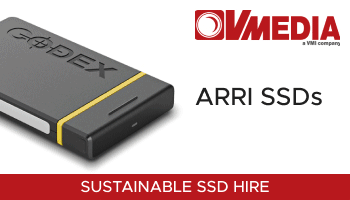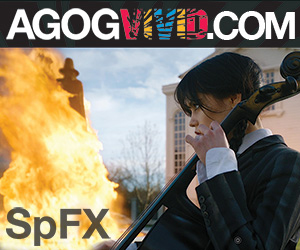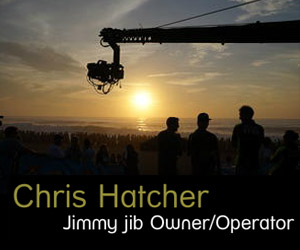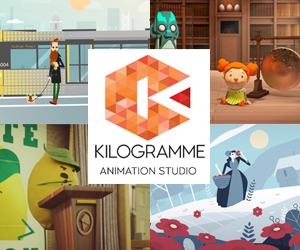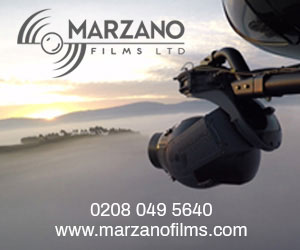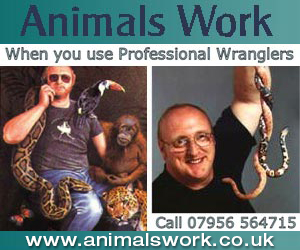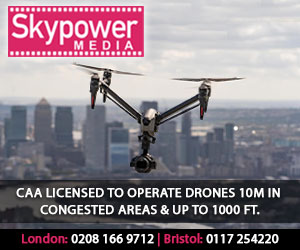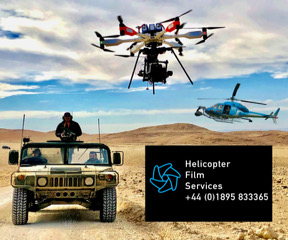Broadcast News
02/10/2019
Shure Presents 'The Future Of Audio For Theatre Productions'
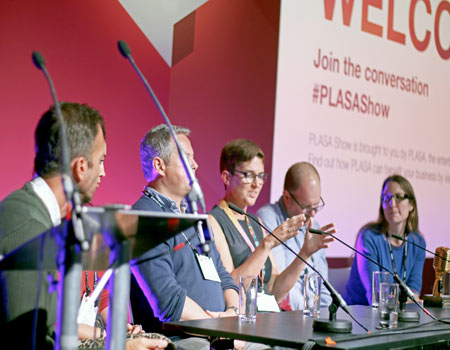
Theatre sound has evolved significantly over the past 20 years. From the increasing availability of wireless microphones, to the development of discreet lavalier mics designed explicitly for theatre - new technology continues to push the industry forward.
In partnership with Curtain Call, Shure put together a panel of industry experts at this 2019’s PLASA Show in London to explore the future of audio for theatre and how it continues to influence the very nature of theatre performance.
Below are some comment highlights:
Hosted by John Schwab, Curtain Call. "Thank you all for coming, I am John from Curtain Call; a platform made to connect on stage and back stage creatives.
"We have constructed a panel with Shure which will take you from the design through to the performance side of sound therefore, we hope you will get a full spectrum of what it takes to put a show on stage."
Panel Introductions:
Siubhan Harrison - Actress – "I have been working as an actor for 16 years from big stage musicals for 2000 seats to smaller musicals."
Richard Brooker, Sound Designer – "I am a sound designer predominantly in musical theatre, mainly working on large scale events with a couple of thousand seats. I have worked on different style musicals and have worked in sound for 30 years and designing for around 17 years."
Zoe Milton – Sound Engineer – "I am a freelance sound engineer predominantly working in theatre and broadcast. I am also administrator for the Association of Sound Designers which is a theatrical association looking after theatre professionals in sound as well as future professionals coming into the industry."
Scott Arnold – Managing Director, Autograph – "I have been at Autograph for 22 years and started there selling batteries. I now run the day to day ins and outs of the business, putting deals together and looking after staff."
Janee Roninson – Deputy Head of Sound – "I am Deputy Head of Sound on Wicked in London, sound operator for 12 years, previously a stage manager. I have been working on Wicked and Les miserable in London."
Stuart Moots – Associate Director Pro Audio, Shure UK – "I am the associate director for the Pro team here at Shure which means we look after people like our panellists in theatre broadcast and film."
I would like to start with Zoe, it seems like there has been a huge shift in technology getting smaller and lighter. Can you give a snapshot of how audio has involved in the last 5 to 10 years? How do you see the shift?
"I think the major thing you notice is that the equipment used to exist for the industry, for example, you would have speakers designed for Rock n Roll and theatre would take them and have to use them in a slightly different way. In the last five years, I have noticed a lot more manufactures are interested in what we are doing in theatre and providing solutions for us. There is a lot more technology that has clearly been thought about. There is a lot of interest in looking after our freelancers and professionals."
You talked about being asked to do more pop rock, a huge change in having big orchestras on a show like Les Miserable to having a band playing at the moment or even a track, how has that moved on?
Richard – "There are various forces that have made that happen, budget being one of them, it costs a lot to have 20 musicians in a pit. There’s scenic design elements where it is more the norm to use more performance space and the genres of music we have seen over the last 15-20 years is more ‘duke box musical’ using an artist’s music to put a musical together, which is normally a pop or rock artist, so we don’t need an orchestra to put those together. The use of tracks to pad out the orchestra is a matter for debate, it works well for touring with a large band because the size of the pit varies dramatically. I still think it is lovely when you go and see a show with more than ten musicians in it."
Site specific has become a major part of our industry which opens up design, mixing and performing issues. How much have you come across that and how much does technology add to this?
Scott – "From our point of view, boundaries are constantly being pushed, everyone wants something different, every show has to be something different otherwise it doesn't last. When a sound designer goes into a show they must think outside the box, they must add something different. There are not enough theatres in London, they are all full up. Companies like Troubadour are building theatres to accommodate the amount of shows that are coming in. Trying to fit a full-scale musical into a 900 seater play house is another challenge."
From Shure's side of things, is this a challenge for you guys too and does this mean you have to come up with new innovations?
Stuart – "Of course, it is thanks to these guys we are where we are today. With the advent of digital wireless and the Axient Digital system, we had to listen. We had to go out and speak to people like our colleagues here to get where we needed to be today. The trade-off is it takes a lot of time to develop, we have to look into other things too like it being very congested in London. When putting huge channel counts into that space, we really need to know what is happening spectrum wise, not only locally but globally and then tie that into a product which gives something for everybody."
I'd like to dig into performing and mixing, can you guys tell us about a challenge in design and tell us how you have come over hurdles to make sure everything is heard, no one wants to see a mic now do they?
Richard – "I think that there has been a lot of pressure from suddenly having all frequencies reduced so everyone has to be extremely clever in developing technologies to fix that, which they have so we now have the same amount of radio mics we always did. For me, on the principal character, I always like to place two mics because as we know, sweat can temporarily dull down a microphone and we have to switch over to B packs so we don't lose any quality and clarity in the sound. Mic packs used to be larger and we used to get a lot of hassle from wardrobe, costume designers, set designers and performers, so there has been a lot of pressures on this side of things and manufacturers have helped by reducing the size of the transmitters. In Shure's case changing the shape of the pack as well so they are more ergonomically beautiful and easier to fit into the small of the back etc. That is helpful for us and has been a challenge for us, you can get an actor sounding absolutely beautiful in a mic position where you cannot really see the mic and then they go off stage and come back on wearing an enormous metre wide sombrero which completely changes the sound and then the director asks why they sound funny and obviously, we need to address that by doing something clever."
Zoe – "For me the main challenge is that we have always tried to make vocal mics as discreet as possible, the biggest change in the last few years is the advent of mixed media shows. You have people on stage but then you also have people on stage filming them and so that’s then in the auditorium so you have these huge close-ups. We lose the couple of metres we had to play with and now you have cameras on stage so we need equipment that can be hidden easily and is reliable enough that you don’t have to get to it all the time. They need to be robust enough to deal with putting mics on a human, there are sweat issues and sometimes you may not be able to place the mics on humans and you need to be able to put them on the set somehow, that all takes time and you need to build those challenges in so you can deal with them early enough."
Siubhan could you take us through the developments of sound that you have seen as a performer?
Siubhan – "Size wise certainly when I started they were bigger than cassettes and there was no way of hiding it, which on some shows is in issue. The best situation that I have had is when I have two in my wig as they are so easily hidden that way and you barely notice it. Sometimes wearing them down your back means they get caught mid costume change and the last thing you want to be doing mid performance is changing a mic pack out."
Janee can you take me through your 12 years, you're now mixing Wicked, what are the complexities of mixing live performance?
"People don't want to hear something in theatre that they could hear on an iPod, they want to hear dynamics. What we do is such a balancing act; mixing for the audience, mixing to the designer specifications, making sure the performers are happy while at the same time making sure the audience are getting the best show possible. This is why digital desks are so revolutionary, because you can pre-load different EQ's for different performers and adjust things here and there to make everything easier when we are mixing line-by-line."
"Asking about what the audience expects to hear is an interesting point, that has changed a lot over the last 15 years. When I started, the intent was to make it entirely unamplified with very light reinforcement and in the advent now of people having surround systems at home and the way that cinemas are now with huge sub-bass, our public now expect something different to what they used to so we now try and give them a live experience, still very focussed but they also want things spinning around behind them and to feel like they are shaking in their seats! We live in a multi-media platform society and theatre should come into that but there is a misconception that if you turn it up, it's better. I think that's something we are battling with sometimes."
Shure launched their campaign "This is the Moment" which celebrates the communication between all points of the process of putting on a production. At what point should the conversation start that 'this is the idea of the show', these are the designers to talk to, what equipment do we bring in? when do we talk to performers about how sound will affect them? It takes hundreds of people to put on a show so how crucial is communication and when should it start?
Scott – "For us, we are at the peril of the designer but Autograph has changed slightly. 15-30 years ago, we may have been involved in that process, but the process has changed and there are a lot more external designers. We have become a company where the design is brought to us and every designer wants to put things together differently which can be frustrating because then you cannot have a standard, so our input into the process is becoming less. It’s a changing model for us."
Richard – "From a design point of view, my communication starts with a meeting with the director and musical supervisor, sometimes a choreographer comes along and that for me is to get an idea of the kind of show they are trying to create. How many in the cast, how many in the band and then I will go see the theatre and look at how I am going to cover the room and how everyone will hear it. I then create a basic spec to try and make that happen. In rehearsals, we then meet the company and musicians and then for me there is a fault in the process because it all stops until we get into theatre for maybe two weeks before the cast arrive and we are straight into tech where there is a time pressure so really although we fizz out a lot of problems, we don’t address them all properly because there isn’t time. I think it would be nice to spend more time with the sound company and the band."
Siubhan – "The designer is often there from the beginning and the set and costume designer work closely with the cast but it would be lovely to discuss the general sound of the show and what we are hoping for. We would know what we are working with if there was more interworking with the designer, the cast and the band. Or the scope of how much movement is in things, what you can expect to hear or what the audience hear because we never know what they hear."
Zoe – "I would say in my experience, when someone says there is a problem it is finding out why today there's a problem. It's actually that if you have a good relationship with crew you can work it out easier."
In partnership with Curtain Call, Shure put together a panel of industry experts at this 2019’s PLASA Show in London to explore the future of audio for theatre and how it continues to influence the very nature of theatre performance.
Below are some comment highlights:
Hosted by John Schwab, Curtain Call. "Thank you all for coming, I am John from Curtain Call; a platform made to connect on stage and back stage creatives.
"We have constructed a panel with Shure which will take you from the design through to the performance side of sound therefore, we hope you will get a full spectrum of what it takes to put a show on stage."
Panel Introductions:
Siubhan Harrison - Actress – "I have been working as an actor for 16 years from big stage musicals for 2000 seats to smaller musicals."
Richard Brooker, Sound Designer – "I am a sound designer predominantly in musical theatre, mainly working on large scale events with a couple of thousand seats. I have worked on different style musicals and have worked in sound for 30 years and designing for around 17 years."
Zoe Milton – Sound Engineer – "I am a freelance sound engineer predominantly working in theatre and broadcast. I am also administrator for the Association of Sound Designers which is a theatrical association looking after theatre professionals in sound as well as future professionals coming into the industry."
Scott Arnold – Managing Director, Autograph – "I have been at Autograph for 22 years and started there selling batteries. I now run the day to day ins and outs of the business, putting deals together and looking after staff."
Janee Roninson – Deputy Head of Sound – "I am Deputy Head of Sound on Wicked in London, sound operator for 12 years, previously a stage manager. I have been working on Wicked and Les miserable in London."
Stuart Moots – Associate Director Pro Audio, Shure UK – "I am the associate director for the Pro team here at Shure which means we look after people like our panellists in theatre broadcast and film."
I would like to start with Zoe, it seems like there has been a huge shift in technology getting smaller and lighter. Can you give a snapshot of how audio has involved in the last 5 to 10 years? How do you see the shift?
"I think the major thing you notice is that the equipment used to exist for the industry, for example, you would have speakers designed for Rock n Roll and theatre would take them and have to use them in a slightly different way. In the last five years, I have noticed a lot more manufactures are interested in what we are doing in theatre and providing solutions for us. There is a lot more technology that has clearly been thought about. There is a lot of interest in looking after our freelancers and professionals."
You talked about being asked to do more pop rock, a huge change in having big orchestras on a show like Les Miserable to having a band playing at the moment or even a track, how has that moved on?
Richard – "There are various forces that have made that happen, budget being one of them, it costs a lot to have 20 musicians in a pit. There’s scenic design elements where it is more the norm to use more performance space and the genres of music we have seen over the last 15-20 years is more ‘duke box musical’ using an artist’s music to put a musical together, which is normally a pop or rock artist, so we don’t need an orchestra to put those together. The use of tracks to pad out the orchestra is a matter for debate, it works well for touring with a large band because the size of the pit varies dramatically. I still think it is lovely when you go and see a show with more than ten musicians in it."
Site specific has become a major part of our industry which opens up design, mixing and performing issues. How much have you come across that and how much does technology add to this?
Scott – "From our point of view, boundaries are constantly being pushed, everyone wants something different, every show has to be something different otherwise it doesn't last. When a sound designer goes into a show they must think outside the box, they must add something different. There are not enough theatres in London, they are all full up. Companies like Troubadour are building theatres to accommodate the amount of shows that are coming in. Trying to fit a full-scale musical into a 900 seater play house is another challenge."
From Shure's side of things, is this a challenge for you guys too and does this mean you have to come up with new innovations?
Stuart – "Of course, it is thanks to these guys we are where we are today. With the advent of digital wireless and the Axient Digital system, we had to listen. We had to go out and speak to people like our colleagues here to get where we needed to be today. The trade-off is it takes a lot of time to develop, we have to look into other things too like it being very congested in London. When putting huge channel counts into that space, we really need to know what is happening spectrum wise, not only locally but globally and then tie that into a product which gives something for everybody."
I'd like to dig into performing and mixing, can you guys tell us about a challenge in design and tell us how you have come over hurdles to make sure everything is heard, no one wants to see a mic now do they?
Richard – "I think that there has been a lot of pressure from suddenly having all frequencies reduced so everyone has to be extremely clever in developing technologies to fix that, which they have so we now have the same amount of radio mics we always did. For me, on the principal character, I always like to place two mics because as we know, sweat can temporarily dull down a microphone and we have to switch over to B packs so we don't lose any quality and clarity in the sound. Mic packs used to be larger and we used to get a lot of hassle from wardrobe, costume designers, set designers and performers, so there has been a lot of pressures on this side of things and manufacturers have helped by reducing the size of the transmitters. In Shure's case changing the shape of the pack as well so they are more ergonomically beautiful and easier to fit into the small of the back etc. That is helpful for us and has been a challenge for us, you can get an actor sounding absolutely beautiful in a mic position where you cannot really see the mic and then they go off stage and come back on wearing an enormous metre wide sombrero which completely changes the sound and then the director asks why they sound funny and obviously, we need to address that by doing something clever."
Zoe – "For me the main challenge is that we have always tried to make vocal mics as discreet as possible, the biggest change in the last few years is the advent of mixed media shows. You have people on stage but then you also have people on stage filming them and so that’s then in the auditorium so you have these huge close-ups. We lose the couple of metres we had to play with and now you have cameras on stage so we need equipment that can be hidden easily and is reliable enough that you don’t have to get to it all the time. They need to be robust enough to deal with putting mics on a human, there are sweat issues and sometimes you may not be able to place the mics on humans and you need to be able to put them on the set somehow, that all takes time and you need to build those challenges in so you can deal with them early enough."
Siubhan could you take us through the developments of sound that you have seen as a performer?
Siubhan – "Size wise certainly when I started they were bigger than cassettes and there was no way of hiding it, which on some shows is in issue. The best situation that I have had is when I have two in my wig as they are so easily hidden that way and you barely notice it. Sometimes wearing them down your back means they get caught mid costume change and the last thing you want to be doing mid performance is changing a mic pack out."
Janee can you take me through your 12 years, you're now mixing Wicked, what are the complexities of mixing live performance?
"People don't want to hear something in theatre that they could hear on an iPod, they want to hear dynamics. What we do is such a balancing act; mixing for the audience, mixing to the designer specifications, making sure the performers are happy while at the same time making sure the audience are getting the best show possible. This is why digital desks are so revolutionary, because you can pre-load different EQ's for different performers and adjust things here and there to make everything easier when we are mixing line-by-line."
"Asking about what the audience expects to hear is an interesting point, that has changed a lot over the last 15 years. When I started, the intent was to make it entirely unamplified with very light reinforcement and in the advent now of people having surround systems at home and the way that cinemas are now with huge sub-bass, our public now expect something different to what they used to so we now try and give them a live experience, still very focussed but they also want things spinning around behind them and to feel like they are shaking in their seats! We live in a multi-media platform society and theatre should come into that but there is a misconception that if you turn it up, it's better. I think that's something we are battling with sometimes."
Shure launched their campaign "This is the Moment" which celebrates the communication between all points of the process of putting on a production. At what point should the conversation start that 'this is the idea of the show', these are the designers to talk to, what equipment do we bring in? when do we talk to performers about how sound will affect them? It takes hundreds of people to put on a show so how crucial is communication and when should it start?
Scott – "For us, we are at the peril of the designer but Autograph has changed slightly. 15-30 years ago, we may have been involved in that process, but the process has changed and there are a lot more external designers. We have become a company where the design is brought to us and every designer wants to put things together differently which can be frustrating because then you cannot have a standard, so our input into the process is becoming less. It’s a changing model for us."
Richard – "From a design point of view, my communication starts with a meeting with the director and musical supervisor, sometimes a choreographer comes along and that for me is to get an idea of the kind of show they are trying to create. How many in the cast, how many in the band and then I will go see the theatre and look at how I am going to cover the room and how everyone will hear it. I then create a basic spec to try and make that happen. In rehearsals, we then meet the company and musicians and then for me there is a fault in the process because it all stops until we get into theatre for maybe two weeks before the cast arrive and we are straight into tech where there is a time pressure so really although we fizz out a lot of problems, we don’t address them all properly because there isn’t time. I think it would be nice to spend more time with the sound company and the band."
Siubhan – "The designer is often there from the beginning and the set and costume designer work closely with the cast but it would be lovely to discuss the general sound of the show and what we are hoping for. We would know what we are working with if there was more interworking with the designer, the cast and the band. Or the scope of how much movement is in things, what you can expect to hear or what the audience hear because we never know what they hear."
Zoe – "I would say in my experience, when someone says there is a problem it is finding out why today there's a problem. It's actually that if you have a good relationship with crew you can work it out easier."
Top Related Stories
Click here for the latest broadcast news stories.
25/09/2012
Orbital Sound Launches New Training Course To Help Theatre Sound Operators
Orbital Sound has announced a brand new training course, designed to help aspiring theatre sound operators take their show mixing skills to the next l
Orbital Sound Launches New Training Course To Help Theatre Sound Operators
Orbital Sound has announced a brand new training course, designed to help aspiring theatre sound operators take their show mixing skills to the next l
17/09/2009
Orbital Sound Announces Theatre Sound 2-Day Training Course In October
Orbital Sound, the leading sound and communication systems specialist for the theatre, event and broadcast markets, has unveiled its latest training p
Orbital Sound Announces Theatre Sound 2-Day Training Course In October
Orbital Sound, the leading sound and communication systems specialist for the theatre, event and broadcast markets, has unveiled its latest training p
01/05/2012
Training Tops The Bill With Orbital’s 11th 'Sound Fundamentals For Theatre' Week
Orbital Sound’s annual Easter 'Sound Fundamentals for Theatre' training course was fully subscribed, with over 20 students taking part in the 4-day pr
Training Tops The Bill With Orbital’s 11th 'Sound Fundamentals For Theatre' Week
Orbital Sound’s annual Easter 'Sound Fundamentals for Theatre' training course was fully subscribed, with over 20 students taking part in the 4-day pr
23/11/2006
DTS Announce Results Of Study Into Home Theatre And Surround Sound Marketplace
DTS has announced the results of its third annual DTS-commissioned study conducted in conjunction with Nielsen Entertainment Research, revealing conti
DTS Announce Results Of Study Into Home Theatre And Surround Sound Marketplace
DTS has announced the results of its third annual DTS-commissioned study conducted in conjunction with Nielsen Entertainment Research, revealing conti
25/02/2020
Prism Sound Selects Vintage Sound
Prism Sound has appointed Vintage Sound as its distributor in Thailand, Laos, Cambodia and Vietnam. They will be responsible for the company's full ra
Prism Sound Selects Vintage Sound
Prism Sound has appointed Vintage Sound as its distributor in Thailand, Laos, Cambodia and Vietnam. They will be responsible for the company's full ra
17/08/2015
Sound Devices 664 and CL-6 Assist Sound Mixer Sharon Frye
Field Mixer Sharon Frye spends the bulk of her time working on such reality television projects as MTV's The Real World and, most recently, Oxygen's B
Sound Devices 664 and CL-6 Assist Sound Mixer Sharon Frye
Field Mixer Sharon Frye spends the bulk of her time working on such reality television projects as MTV's The Real World and, most recently, Oxygen's B
22/05/2014
Sound Mixer Relies On Sound Devices' Digital Recorder For Audio Production
Veteran Sound Mixer Danny Michael, whose recent portfolio includes the high-profile feature films The Secret Life of Walter Mitty with Ben Stiller, Jo
Sound Mixer Relies On Sound Devices' Digital Recorder For Audio Production
Veteran Sound Mixer Danny Michael, whose recent portfolio includes the high-profile feature films The Secret Life of Walter Mitty with Ben Stiller, Jo
27/03/2013
Prism Sound Reveals Lyra Audio Interface At Prolight + Sound 2013
European studio producers, musicians and DJs will have their first opportunity to see Prism Sound’s new Lyra family of Audio Interfaces at this year’s
Prism Sound Reveals Lyra Audio Interface At Prolight + Sound 2013
European studio producers, musicians and DJs will have their first opportunity to see Prism Sound’s new Lyra family of Audio Interfaces at this year’s
25/09/2012
Soularity Sound Upgrade To 5.1 Surround Sound Production Capability
Providing cutting-edge post-production audio services for the thriving independent film industry in Austin, Texas, Korey Pereira, Owner and Lead Engin
Soularity Sound Upgrade To 5.1 Surround Sound Production Capability
Providing cutting-edge post-production audio services for the thriving independent film industry in Austin, Texas, Korey Pereira, Owner and Lead Engin
08/08/2012
DPA Microphones Brings Exceptional Sound Quality To The Live Sound And Touring Industries
At PLASA 2012 (Hall 1, Stand F38), DPA Microphones and its UK distributor Sound Network will showcase an outstanding range of high quality microphones
DPA Microphones Brings Exceptional Sound Quality To The Live Sound And Touring Industries
At PLASA 2012 (Hall 1, Stand F38), DPA Microphones and its UK distributor Sound Network will showcase an outstanding range of high quality microphones
01/08/2006
Prism Sound helps José Gonzáles sound even sweeter
Electric Mastering, the most recent addition to the UK's mastering scene, has been using Prism Sound's ADA-8XR multichannel converter processor to mas
Prism Sound helps José Gonzáles sound even sweeter
Electric Mastering, the most recent addition to the UK's mastering scene, has been using Prism Sound's ADA-8XR multichannel converter processor to mas
19/09/2008
Iconic Film Theatre Celebrates 40 Years
What was originally a tiny film theatre in a grim back alley, but which maintained its 'vision' throughout more than 30 years of the NI Troubles, Quee
Iconic Film Theatre Celebrates 40 Years
What was originally a tiny film theatre in a grim back alley, but which maintained its 'vision' throughout more than 30 years of the NI Troubles, Quee
10/05/2011
Orbital's Sound Fundamentals Training Week Strikes Ten
Orbital Sound, a leading sound and communication systems specialist for the theatre, event and broadcast markets, ran its 10th annual Sound Fundamenta
Orbital's Sound Fundamentals Training Week Strikes Ten
Orbital Sound, a leading sound and communication systems specialist for the theatre, event and broadcast markets, ran its 10th annual Sound Fundamenta
05/03/2014
Robe Celebrates 20 Years At Prolight + Sound
As Robe Lighting celebrates its 20th year in business, the company will be showcasing some of its lineup at this year's Prolight + Sound in Frankfurt.
Robe Celebrates 20 Years At Prolight + Sound
As Robe Lighting celebrates its 20th year in business, the company will be showcasing some of its lineup at this year's Prolight + Sound in Frankfurt.
03/10/2012
Industry Veteran Brings More Than 20 Years of Experience To Sound Devices
Sound Devices, developer of audio and video products for field production, has announced Pat McConnell as sales manager. In his new position, Pat will
Industry Veteran Brings More Than 20 Years of Experience To Sound Devices
Sound Devices, developer of audio and video products for field production, has announced Pat McConnell as sales manager. In his new position, Pat will




